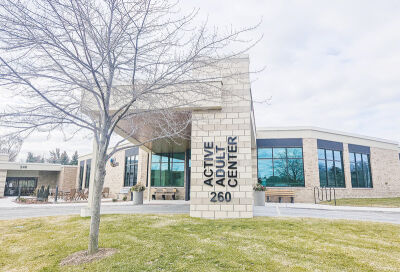
Scams targeting senior citizens — and how to guard against them — will be the topic of discussion by Michigan Attorney General Dana Nessel during her visit to the new Madison Heights Active Adult Center Feb. 26. The center is located between City Hall and the library.
Photo by Patricia O’Blenes
MADISON HEIGHTS — Con artists take many forms, using technology to pose as relatives, utility workers or government officials. An upcoming presentation by Michigan Attorney General Dana Nessel will examine some of the most troubling scams targeting seniors.
Arranged by state Rep. Mike McFall, D-Hazel Park, representing House District 8, the talk will take place from 10 a.m. to 11:30 a.m. Monday, Feb. 26, at the new Active Adult Center, between City Hall and the library at 260 W. 13 Mile Road in Madison Heights. Admission is free.
“They’re a vulnerable segment of our society, our seniors. And unfortunately, there are people trying to make money off them,” said Madison Heights City Councilman David Soltis.
According to Danny Wimmer, press secretary for the attorney general, imposter scams are among the most common. These include scams where the con artist poses as a relative, such as a grandchild needing money for an emergency situation, or as a worker from a utility company claiming there are overdue bills in need of immediate payment.
The con artist may also claim they are with the Internal Revenue Service or some other government agency, or even pose as a single person looking for a relationship, when they’re really just trying to exploit loneliness for financial gain. The con artist may also claim they’re from a health care provider, tech support or from a sweepstakes company. Increasingly, scammers are using artificial intelligence to make their scams look and sound more convincing.
Scams often feature urgent requests or limited time offers, and a believable story as a pretext, followed by a request for money or personal information. When money is requested, the scam usually asks for funds to be transmitted via difficult-to-trace payment methods such as gift cards, cash cards, wire transfer, or cryptocurrency, including bitcoin.
Kyle Hebert, a sergeant with the Hazel Park Police Department, said most scammers will call or email random people until they come across a victim who engages with them.
“Keep in mind that scammers often try to create an immediate urgency and claim there is no time to do anything other than what they’re demanding,” Hebert said via email. “In reality, this is almost never the case. Ask for more details. Get their information, such as their name and who they are representing. And then tell them you will be calling their agency to verify. Obtain a contact number for that agency from a different source — not the caller. Do not give out your personal or financial information such as your social security number, birthdate, credit card number, bank account number, or any payment unless you have fully confirmed the identity of the person asking for it, and a valid need for this information or payment exists.”
Seniors can also call their local police department with any suspicions they may have, or if they need assistance vetting the authenticity of the caller. If they feel that they have fallen victim to a con, they should contact the police to file a report.
Possible scams or suspicious behavior can also be reported to the Federal Trade Commission by calling 1-877-FTC-HELP, or by visiting reportfraud.ftc.gov.
Lt. David Koehler, with the Madison Heights Police Department, said he has observed specific trends.
“The current scams have been telephone calls from someone purporting to be from DTE and that the bill is overdue, and if payment isn’t made, power will be shut off,” Koehler said in an email. “(Another trend has been) door-to-door soliciting for work.”
The Department of the Attorney General enforces numerous statutes meant to stop scams, such as the Consumer Protection Act that allows the attorney general to pursue scammers.
The department also handles about 10,000 consumer complaints a year, and works closely with the Better Business Bureau and the Federal Trade Commission to compile information about new and active scams by sharing information nationally.
Roslyn Grafstein, the mayor of Madison Heights, thanked the attorney general for her upcoming visit and her work on the issue.
“The program Attorney General Nessel is presenting will not only help educate our seniors, but it will also provide them with places they can turn to for help if they encounter something suspicious and want to confirm its authenticity,” Grafstein said in an email.
McFall also thanked the attorney general.
“We are lucky to have such a strong leader in our state like Attorney General Dana Nessel,” McFall said in a statement. “I am proud to join her in bringing vital information to seniors to ensure they are equipped with the necessary knowledge to find the resources they need, and how to identify bad actors.”
Soltis said he would like to see even more educational outreach about scams.
“Many seniors tend to be more trusting to what people say and promise, since they’re from a different generation,” Soltis said. “We need to do a better job protecting them, showing them they don’t have to deal with anyone they’re unsure about. They should hang up the phone, shut the door and not give out any information. Just because someone knows your (phone) number or address doesn’t mean they’re legitimate.”
 Publication select ▼
Publication select ▼

























